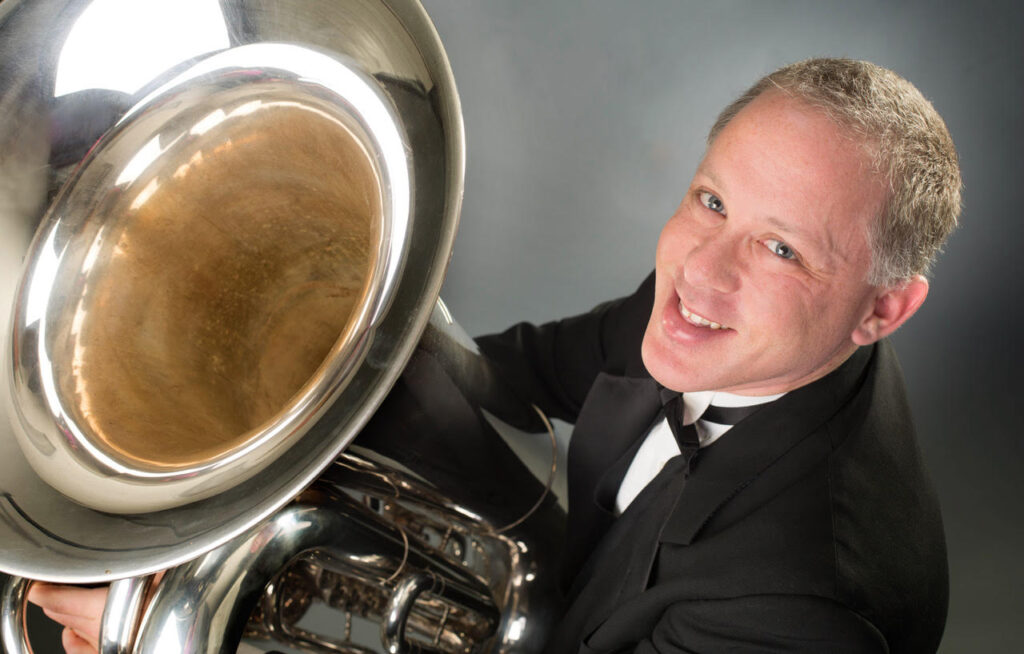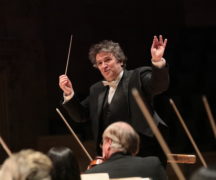By DAVID DUPONT
BG Independent News
It’s fitting that David Saltzman won an award named after one of his teachers.
Saltzman, an associate teaching professor of tuba and euphonium at BGSU and principal tuba for the Toledo Symphony, received the Dan Perantoni Teaching Award from the International Tuba Euphonium Association earlier this month.
Perantoni was one of several teachers who have shaped Saltzman as a musician. That pedagogical line starts with the elementary school music teacher who offered him “extra credit” to switch from percussion to tuba because Saltzman had big lips. It includes his private teacher in high school who laid down the law to get him to practice more. And Harvey Phillips, an American brass legend, with whom he. studied at the University of Indiana in the two years before Phillips retired.
Dan Perantoni was his replacement.

Saltzman was nominated for the award by his students. Being chosen to receive it was a surprise. “It’s very humbling, very exciting,” he said.
Perantoni and Phillips serve as his models as a college professor.
Phillips would have students over for meals at his house and do chores around his farm. They would meet the famous artists who were Phillips’ guests.
While Saltzman had envisioned himself as a performer who taught, he now sees teaching as “the icing on the cake,” he said. “I enjoy them both equally.’
He started teaching at the University of Hawaii when he played with the Honolulu Symphony. He was just a year out of Indiana and teaching students who were just a few years younger than he was. He started teaching at BGSU after he moved to Northwest Ohio to take the tuba position with the Toledo Symphony.
“I love the interaction with students on a daily basis,” he said. “I love watching the new students grow, that mentorship, watching them spread their wings and seeing what they do having families and having careers. Having a community of students and friends afterwards – it’s been a really great experience.”
Nurturing a successful studio requires having the right people in place. “Not only can they play well but they are people who want to work with other people,” he said.
The mission to train teachers filters throughout the College of Musical Arts. “Everybody who comes to the school, even if they’re a performance major, wants to educate in some way. They want to be part of that team.”
Saltzman recalls coming back to the school late at night after a concert and observing three students playing together. “That’s what makes a studio a studio. They build the relationships with each other, the ability to teach each other, mentor each other, help each other,” he said.
The element of competition for positions in ensembles, and later jobs, exists, but once the decision is made, they remain supportive of each other.
Playing chamber music is essential for developing this. Tuba players typically serve in a more supportive role. Participating in small ensembles of euphoniums and tubas is a challenge. They must play the melodies, and counter melodies. They make the decisions on tempo and balance. And each member of the ensemble shares those responsibilities.
“It’s one of the things that’s most helpful for young musicians to do,” Saltzman said.
That attention to chamber music paid off when a euphonium and tuba quartet placed second in the undergraduate division of the college’s Wayland Chamber Music Competition, and a tuba quartet placed second in the graduate division.
Saltzman grew up in Monroe, New York, just north of New York City in the Hudson River Valley. His mother had him and his twin brother and sister take piano lessons and sing in choir.
When he was in fourth grade, he started playing drums in the school band, but in a few months a teacher convinced him to switch to tuba. “I didn’t care that much,” Saltzman said. “I just wanted something big to annoy my older sister and twin brother.”
In high school the band room was his safe place. That’s where most of his friends were and where he felt most comfortable. About the time he was a sophomore, his private teacher told him he needed to practice more, or he would drop him. That pushed him to take the instrument more seriously.
“Honestly I just love the sound of my instrument,” he said. And he also loves working with other musicians and “being a part of something bigger.”
Saltzman has found that satisfaction as a member of the Toledo Symphony.
“I love my job with the Toledo Symphony,” Saltzman said. “Toledo is a happy orchestra. The people in it are very good. There’s a good sense of community. It’s a nice place to go to work.”
That’s not true of all orchestras, he noted.
His goal has been to work in an orchestra and “explore repertoire that’s exciting to me and earn enough money that I could live my life.”
Working with music director Alain Trudel is a joy. “Alain’s an incredible musician. He has ears from God.”
Trudel, who is also a superb classical and jazz trombonist, is appreciative of Saltzman’s talents. In a pre-concert talk before a recent performance of Stravinsky’s “Petrushka,” he singled out Saltzman comic rendering of the lumbering circus bear for praise.
In 2018, Saltzman presented the premiere performance of Samuel Adler’s tuba concerto. He had approached the composer, who attends the same synagogue as Saltzman, about writing the piece. Adler started composing it before Saltzman had lined up the money to pay him.
Saltzman and his family have enjoyed life in the Toledo area. While Hawaii had its beaches and sunshine, the cost of living was exorbitant. They moved from a cramped condo to a house in Sylvania. They have three children, all of whom are involved in music, though probably not as a career.
Saltzman met his wife, Barbara, at music camp. She has a doctorate in epidemiology and teaches at the University of Toledo. “She’s the brains of the family,” Saltzman quipped. “I just blow hot air into tubes.”





